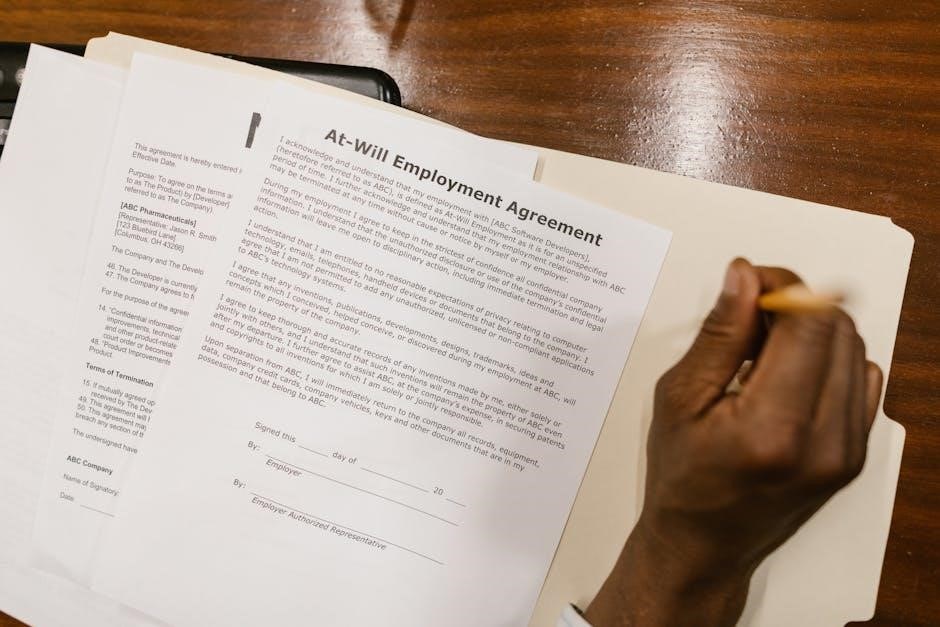A Florida short-term rental agreement is a legal contract between landlords and tenants, outlining terms for temporary property use, essential for vacation rentals and short-term leases, ensuring clarity and compliance with state laws.
1.1 Definition and Purpose
A Florida short-term rental agreement is a legally binding contract between a landlord and tenant, outlining the terms for temporary property use. It is designed for rentals lasting less than 30 days, often used for vacation homes or Airbnb-style arrangements. The purpose of this agreement is to establish clear expectations, responsibilities, and payment terms, protecting both parties. It ensures compliance with Florida’s legal requirements and local ordinances, providing a framework for resolving disputes. This document is essential for property owners and guests to maintain a smooth and legally compliant rental experience in Florida’s vibrant tourism-driven market.
1.2 Importance in Florida’s Rental Market
Florida’s short-term rental agreements play a vital role in the state’s thriving rental market, particularly driven by tourism. These agreements provide a legal framework for vacation rentals, ensuring clarity and protection for both landlords and tenants. They facilitate the operation of platforms like Airbnb and Vrbo, which are integral to Florida’s economy. By defining terms and responsibilities, these agreements help prevent disputes and ensure compliance with local regulations. They also allow property owners to capitalize on the state’s high demand for temporary housing, making short-term rentals a lucrative and sustainable option in Florida’s competitive market.
Types of Short-Term Rental Agreements
Florida short-term rental agreements include vacation rentals and month-to-month leases, each tailored to specific rental needs and durations, providing flexibility for landlords and tenants alike.
2.1 Vacation Rentals
A vacation rental agreement in Florida is a short-term contract for temporary use of a property, typically for leisure purposes. These agreements are designed for periods of less than 30 days and are popular among tourists and seasonal visitors. The contract outlines the rights and responsibilities of both the landlord and the tenant, ensuring a smooth rental experience. Key details include the rental period, payment terms, and property usage guidelines. This type of agreement is ideal for property owners who want to rent out their vacation homes or condos to guests seeking short-term accommodations in Florida.
2.2 Month-to-Month Leases
A month-to-month lease in Florida is a short-term rental agreement that renews automatically every 30 days, offering flexibility for both landlords and tenants. This type of lease is ideal for situations where the rental period is uncertain or temporary. Unlike fixed-term leases, month-to-month agreements can be terminated by either party with a minimum of 30 days’ written notice. The terms, including rent and property use, remain consistent unless modified by mutual agreement. This arrangement is popular for tenants who need temporary housing and landlords who want to keep their rental options open without long-term commitments.
Legal Requirements for Short-Term Rentals in Florida
Florida short-term rentals must comply with state laws, local ordinances, and health/safety standards. Landlords must obtain necessary licenses, adhere to zoning rules, and ensure proper documentation for tax purposes.
3.1 State Laws Governing Rentals
Florida state laws regulate short-term rentals, requiring compliance with specific legal standards. These include obtaining necessary licenses, adhering to zoning regulations, and meeting health and safety standards. Senate Bill 1128 grants the state authority to oversee short-term vacation rentals, ensuring consistency across jurisdictions. Landlords must also comply with tax obligations, including sales tax and local tourist development taxes. Additionally, state laws distinguish between short-term and long-term rentals, with agreements typically spanning less than 30 days. Proper documentation and adherence to these regulations are crucial to avoid legal disputes and penalties.
3.2 Local Ordinances and Compliance
Local ordinances in Florida play a crucial role in regulating short-term rentals, varying by city or county. Many jurisdictions require property owners to obtain special licenses or permits to operate short-term rentals. Zoning laws, noise restrictions, and occupancy limits are common local regulations. For example, cities like Miami Beach and Key West have strict rules to manage tourism impacts. Compliance with these ordinances is essential to avoid fines or legal action. Landlords must also ensure their properties meet local health and safety standards. Failure to adhere to local rules can result in penalties, emphasizing the importance of understanding and following specific municipal requirements.

Benefits of Using a Short-Term Rental Agreement
A short-term rental agreement offers flexibility, financial gains, and legal protection for landlords and tenants. It streamlines the rental process and fosters trust through clear expectations and obligations.
4.1 Flexibility for Landlords and Tenants
A Florida short-term rental agreement provides flexibility for landlords and tenants. Landlords can adjust rental periods, set seasonal rates, and terminate agreements with minimal notice. Tenants benefit from shorter commitments, ideal for temporary stays or vacations. This flexibility allows both parties to adapt to changing circumstances, such as market demand or personal needs. It also enables landlords to manage their properties more effectively, especially during peak tourism seasons. The agreement’s adaptability ensures a balanced arrangement, catering to the diverse needs of both landlords and tenants in Florida’s dynamic rental market.
4.2 Financial Advantages
Short-term rental agreements in Florida offer significant financial benefits for landlords. They allow for higher rental rates during peak seasons, maximizing income potential. Landlords can adjust pricing based on demand, such as charging premium rates for holidays or special events. Additionally, short-term rentals enable landlords to generate steady cash flow without long-term commitments. Tenants also benefit from affordable options for temporary stays. This financial flexibility makes short-term agreements a lucrative option for property owners in Florida’s thriving tourism and rental market, ensuring both parties can achieve their economic goals effectively.

Key Clauses in a Short-Term Rental Agreement
A Florida short-term rental agreement must include essential clauses such as term and termination, rent and payment terms, responsibilities of both parties, and compliance with local laws.
5.1 Term and Termination Details
The term and termination details in a Florida short-term rental agreement outline the duration of the tenancy and conditions for ending the contract. Typically, short-term agreements last less than 30 days, with specific start and end dates. The termination clause explains how either party can end the agreement, often requiring a minimum notice period, such as 30 days for month-to-month leases. It also specifies penalties for early termination or breach of contract. Clear terms ensure both landlord and tenant understand their obligations and the process for ending the rental period, protecting both parties legally.
5.2 Rent and Payment Terms
The rent and payment terms in a Florida short-term rental agreement detail the amount, payment methods, and due dates. Rent is usually payable monthly or upfront, with late fees specified for overdue payments. The agreement may include security deposits, utility responsibilities, and additional charges, such as cleaning fees. It also outlines acceptable payment methods, like checks or digital transfers, and the consequences of payment failures. Clear payment terms ensure a smooth financial transaction and minimize disputes between landlords and tenants throughout the rental period. This section is crucial for maintaining a transparent and legally binding agreement.
5.3 Responsibilities of Both Parties
The responsibilities of both parties in a Florida short-term rental agreement are clearly outlined to ensure a smooth rental experience. Landlords are typically responsible for maintaining the property’s condition, addressing repairs, and ensuring compliance with local laws. Tenants, on the other hand, must maintain the property’s cleanliness, pay rent on time, and adhere to the agreed-upon rules. Both parties are expected to communicate effectively and fulfill their obligations as stated in the agreement. This mutual accountability ensures a fair and respectful rental relationship, protecting the interests of both landlords and tenants throughout the rental period.

How to Create a Florida Short-Term Rental Agreement
To create a Florida short-term rental agreement, start by identifying the rental period and property details. Include the names and contact information of both the landlord and tenant. Outline the terms and conditions, such as rent amount, payment methods, and due dates. Detail the responsibilities of both parties, including property maintenance and compliance with local laws. Specify the maximum number of occupants and any rules for the premises. Finally, ensure the agreement complies with Florida’s legal requirements and have both parties sign and date the document. This creates a legally binding and clear contract for all involved.
Regulations Governing Short-Term Rentals
In Florida, short-term rentals are regulated by both state laws and local ordinances. Properties must comply with licensing and registration requirements, as well as health and safety standards. Zoning laws may restrict short-term rentals in certain areas. Additionally, local governments can impose specific rules, such as limiting the number of rental properties or requiring inspections. Recent legislative changes aim to balance the interests of landlords, local communities, and tourists. Understanding and adhering to these regulations is crucial for legally operating a short-term rental in Florida and avoiding penalties or legal issues. Proper compliance ensures a smooth rental experience for both parties.
A Florida short-term rental agreement differs from long-term leases in duration, purpose, and legal terms. Short-term agreements typically cover periods under 30 days, often for vacation rentals, whereas long-term leases usually span a year or more. Short-term agreements offer more flexibility, allowing landlords to rent to multiple tenants throughout the year. They also include specific clauses about check-in, check-out, and property maintenance, which are absent in long-term contracts. Additionally, short-term rentals may require adherence to local tourism and zoning regulations, unlike traditional leases. This distinction ensures tailored agreements for temporary versus permanent occupancy needs. A breach of contract in a Florida short-term rental agreement occurs when either the landlord or tenant fails to fulfill their obligations as outlined in the contract. Common breaches include non-payment of rent, unauthorized occupants, or violating property use terms. If a breach occurs, the injured party may pursue legal remedies, such as termination of the agreement or seeking damages. Tenants may also face eviction for non-compliance. Understanding breach clauses is crucial for both parties to avoid disputes and ensure adherence to the agreed-upon terms. Florida law provides specific guidelines for addressing breaches in short-term rental contracts; Short-term rentals in Florida are subject to specific tax implications that landlords must understand. Rental income is taxable under state and federal laws, and landlords must report it on their tax returns. Additionally, local governments may impose tourist development taxes or occupancy taxes, which vary by county. Landlords may also benefit from deductions for expenses like property maintenance, utilities, and insurance. The IRS considers short-term rentals as a business activity, allowing for potential tax deductions. Proper documentation and compliance with tax regulations are essential to avoid penalties and ensure financial clarity in managing short-term rental properties. Florida short-term rental agreement templates can be easily found online through legal document websites, real estate associations, and rental management platforms. Websites like Florida Realtors® and Rocket Lawyer offer customizable templates designed to comply with state and local laws. Additionally, platforms like LawDepot and PDFSimpli provide downloadable PDF formats for short-term rental agreements. These templates are tailored to address specific Florida regulations, ensuring landlords and tenants have a clear, legally binding contract. Always verify the source for accuracy and compliance with current laws before use.
Differences from Long-Term Lease Agreements

Understanding Breach of Contract

Tax Implications for Short-Term Rentals

Where to Find Florida Short-Term Rental Agreement Templates



